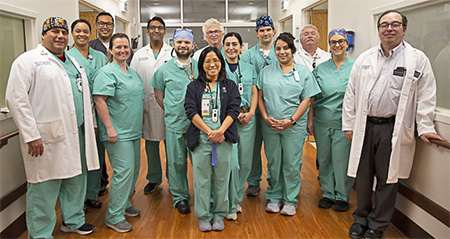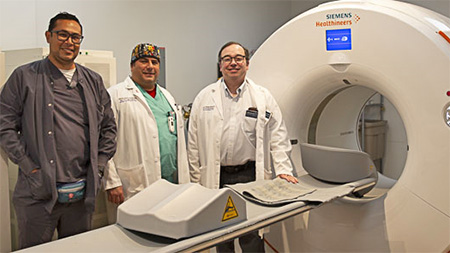As the fight against cancer faces an everchanging landscape, one team at Audie L. Murphy VA San Antonio has found innovation of nuclear proportions.
Many cancer treatments involve radiation. South Texas VA uses Selective Internal Radiation Treatment (SIRT) with Yttrium-90 (Y-90) to treat both primary and metastatic cancers in the liver. SIRT is done with tiny microspheres containing Y-90 that enable a targeted delivery of lethal radiation to the cancers. This technique kills the cancer and limits harm to the surrounding healthy tissue. Most importantly, this procedure kills cancer without the need for a major surgery, a hospital stay or a prolonged recovery.
South Texas marked its first year of the Y-90 program in May, but Dr. Raul Palacios, chief of Interventional Radiology, has been leading the charge for more than a decade. He first began this program while working for the Department of Defense at the Brooke Army Medical Center.
Pictured above left to right: Jose Rodriguez, nuclear medicine technologist, Palacios and Dr. Mitch Courtines, radiologist.
“I-CARE attitude paid off.”
“It took seven years and so many unforeseen struggles, but perseverance and an ‘I-CARE’ attitude paid off in the end. As health care professionals, we are so often faced with a choice that we know is right but very very hard,” Palacios said.

One of those struggles was obtaining the licensure required in order to certify this program. Joseph Beckman, radiation safety officer, worked tirelessly through the paperwork and logistics to ensure the hospital was granted the license.
“Navigating the bureaucratic maze would have been impossible without Dr. Palacios’ dedication, due to the detail requirements for each of the lead actors in Intervention Radiation, Nuclear Medicine and Radiation Safety,” Beckman said. “This effort was well worth the time and energy due to the significant improvements in the procedure and the successful extension of Veterans’ quality of life.”
Outside hospital cost averages $100,000
Just as Beckman emphasized the dedication of the Radiation Safety Service, Palacios said this was a selfless commitment by so many VA employees to provide the best care for our Veterans. It brought together the departments of radiology, hepatology, oncology, nuclear medicine, radiation safety and logistics to make this Y-90 program successful.
“It was an advocacy for our Veterans that made us take those challenging steps so our Veterans can get the care they need here where they are most comfortable and within reach of their doctors who take care of them,” Palacios added.
So far, more than 40 patients have received the treatment.
South Texas is one of 23 VA sites across the nation with the Y-90 accreditation and also ranks as fourth in the nation for local, regional treatment of cancer. Palacios takes great in his work, but gives all the credit to the VA team that assists him in making it possible.
“In this pursuit of excellence, a host of dedicated personnel including physicists, technologists, nurses, doctors and industry experts came together so our Veterans can get state of the art care for primary and metastatic liver cancers,” Palacios said.
Topics in this story
More Stories
The Medical Foster Home program offers Veterans an alternative to nursing homes.
Watch the Under Secretary for Health and a panel of experts discuss VA Health Connect tele-emergency care.
The 2024 National Veteran Suicide Prevention Annual Report provides the foundation for VA’s suicide prevention programs and initiatives.






